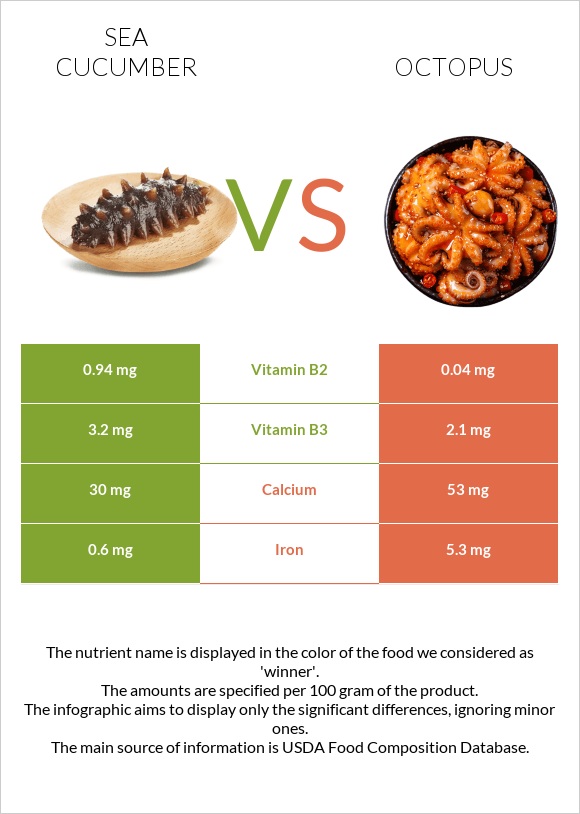Sea cucumber vs. Octopus — In-Depth Nutrition Comparison
Compare
Significant differences between sea cucumber and octopus
- Sea cucumber is richer in vitamin B2, while octopus is higher in iron and calcium.
- Octopus covers your daily iron needs 112% more than sea cucumber.
- Sea cucumber has 12 times more vitamin B2 than octopus. Sea cucumber has 0.94mg of vitamin B2, while octopus has 0.076mg.
Specific food types used in this comparison are Sea cucumber, yane (Alaska Native) and Mollusks, octopus, common, cooked, moist heat.
Infographic

Infographic link
Mineral Comparison
Mineral comparison score is based on the number of minerals by which one or the other food is richer. The "coverage" charts below show how much of the daily needs can be covered by 300 grams of the food.
| Contains less SodiumSodium | -100% |
| Contains more CalciumCalcium | +253.3% |
| Contains more IronIron | +1490% |
Vitamin Comparison
Vitamin comparison score is based on the number of vitamins by which one or the other food is richer. The "coverage" charts below show how much of the daily needs can be covered by 300 grams of the food.
| Contains more Vitamin B2Vitamin B2 | +1136.8% |
| Contains more Vitamin B1Vitamin B1 | +14% |
| Contains more Vitamin B3Vitamin B3 | +18.1% |
All nutrients comparison - raw data values
| Nutrient |  |
 |
DV% diff. |
| Vitamin B12 | 36µg | 1500% | |
| Selenium | 89.6µg | 163% | |
| Iron | 0.6mg | 9.54mg | 112% |
| Copper | 0.739mg | 82% | |
| Vitamin B2 | 0.94mg | 0.076mg | 66% |
| Vitamin B6 | 0.648mg | 50% | |
| Phosphorus | 279mg | 40% | |
| Protein | 13g | 29.82g | 34% |
| Cholesterol | 96mg | 32% | |
| Zinc | 3.36mg | 31% | |
| Sodium | 460mg | 20% | |
| Potassium | 630mg | 19% | |
| Vitamin B5 | 0.9mg | 18% | |
| Choline | 81mg | 15% | |
| Magnesium | 60mg | 14% | |
| Vitamin A | 90µg | 10% | |
| Vitamin C | 8mg | 9% | |
| Calcium | 30mg | 106mg | 8% |
| Vitamin E | 1.2mg | 8% | |
| Folate | 24µg | 6% | |
| Calories | 56kcal | 164kcal | 5% |
| Vitamin B3 | 3.2mg | 3.78mg | 4% |
| Fats | 0.4g | 2.08g | 3% |
| Polyunsaturated fat | 0.477g | 3% | |
| Manganese | 0.047mg | 2% | |
| Saturated fat | 0.453g | 2% | |
| Carbs | 0g | 4.4g | 1% |
| Vitamin B1 | 0.05mg | 0.057mg | 1% |
| Monounsaturated fat | 0.324g | 1% | |
| Net carbs | 0g | 4.4g | N/A |
| Vitamin K | 0.1µg | 0% | |
| Tryptophan | 0.334mg | 0% | |
| Threonine | 1.283mg | 0% | |
| Isoleucine | 1.298mg | 0% | |
| Leucine | 2.099mg | 0% | |
| Lysine | 2.228mg | 0% | |
| Methionine | 0.673mg | 0% | |
| Phenylalanine | 1.069mg | 0% | |
| Valine | 1.303mg | 0% | |
| Histidine | 0.573mg | 0% | |
| Omega-3 - EPA | 0.152g | N/A | |
| Omega-3 - DHA | 0.162g | N/A | |
| Omega-3 - DPA | 0.012g | N/A |
Macronutrient Comparison
Macronutrient breakdown side-by-side comparison
Protein:
13 g
Fats:
0.4 g
Carbs:
0 g
Water:
80.7 g
Other:
5.9 g
Protein:
29.82 g
Fats:
2.08 g
Carbs:
4.4 g
Water:
60.5 g
Other:
3.2 g
| Contains more WaterWater | +33.4% |
| Contains more OtherOther | +84.4% |
| Contains more ProteinProtein | +129.4% |
| Contains more FatsFats | +420% |
| Contains more CarbsCarbs | +∞% |



